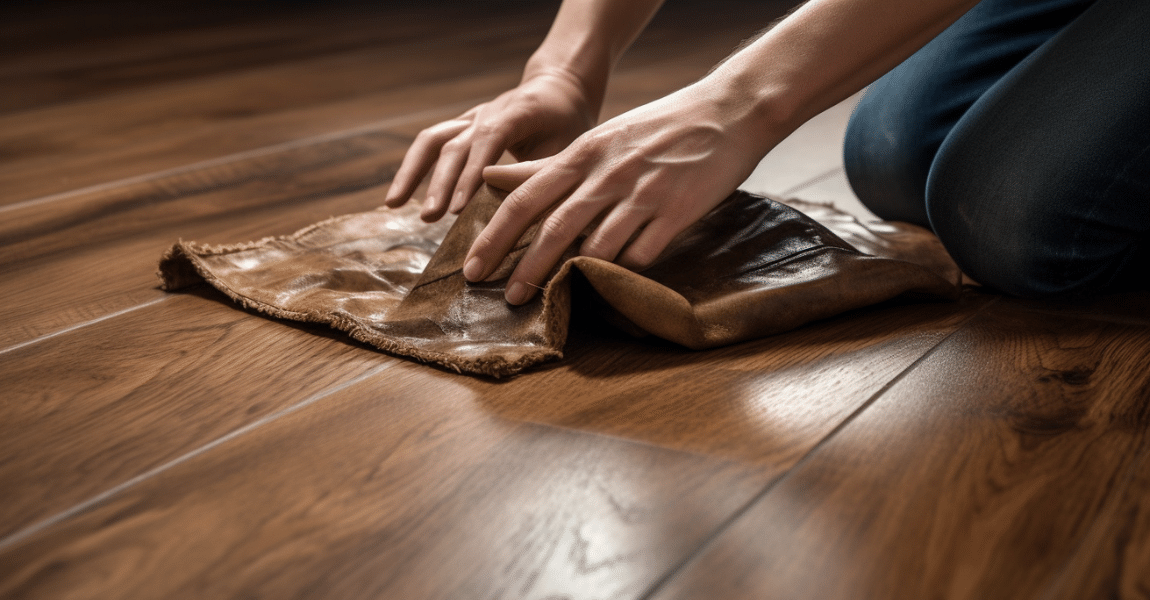If you have hardwood floors in your home, you know how beautiful they can look when they are clean and polished. However, when grease stains appear, they can be a stubborn and unsightly problem. Whether it’s from cooking mishaps or spills, grease can be difficult to remove from hardwood floors without causing damage. But don’t worry, with the right techniques and tools, you can easily get grease off your hardwood floors and restore them to their original shine.
In this article, you will learn how to identify the type of grease stain on your hardwood floor, how to use natural solutions and commercial cleaners to remove the stain, and how to buff and polish the floor to restore its shine. You will also learn how to prevent future grease stains on your hardwood floors.
With these tips and tricks, you can keep your hardwood floors looking their best and enjoy them for years to come. So, let’s get started on getting that pesky grease off your hardwood floors!
Identifying the Type of Grease Stain
You’ll want to figure out what kind of grease stain you’re dealing with before you start cleaning, so don’t skip this step if you want to avoid any further frustration! There are different types of grease stains that can be found on hardwood floors, and each type requires a different cleaning approach.
One way to determine the type of grease stain is to look at its color and texture. Causes and prevention are important factors to consider when dealing with grease stains. Grease stains can be caused by various sources, such as food spills, cooking oil, or even foot traffic.
To prevent grease stains from occurring, it’s important to clean up any spills or messes as soon as they happen. Using a doormat or area rug can also help minimize the dirt and grease that gets tracked onto your hardwood floors.
It’s also important to differentiate old and new stains. New grease stains are easier to clean compared to old ones that have been sitting on your hardwood floors for some time. If the grease stain is fresh, you can simply use a clean cloth and warm soapy water to remove it. However, if the stain has been sitting for a while, it might require a more aggressive cleaning approach.
Knowing the type of grease stain and how long it has been there will help you determine the right cleaning method to use and achieve the best results.
Using Natural Solutions for Grease Removal
Natural solutions are a great way to keep your hardwood floors looking clean and spotless, especially when it comes to tackling pesky grease stains. Instead of using harsh chemicals that can damage the wood, try using DIY alternatives that are eco-friendly and safe for your family and pets.
Here are a few options to consider:
- One natural solution for removing grease stains from hardwood floors is vinegar. Simply mix equal parts vinegar and water in a spray bottle, then spray the solution directly onto the stain. Let it sit for a few minutes, then wipe it away with a clean cloth. Vinegar is a powerful cleaning agent that can cut through grease and grime, leaving your floors looking clean and shiny.
- Another eco-friendly option is baking soda. Sprinkle a generous amount of baking soda onto the grease stain, then use a damp cloth to gently scrub the area. This will help to absorb the grease and lift it from the surface of the floor. Once you’ve scrubbed the area thoroughly, wipe it clean with a damp cloth and dry it with a towel.
- If you’re dealing with a particularly stubborn grease stain, you may want to try using a mixture of baking soda and vinegar. This powerful combination can cut through even the toughest stains, leaving your hardwood floors looking like new. Simply mix equal parts baking soda and vinegar to create a paste, then apply it directly to the stain. Let it sit for a few minutes, then scrub the area with a damp cloth. Rinse the area with water, then dry it with a towel.
With these simple DIY alternatives, you can easily remove grease stains from your hardwood floors without resorting to harsh chemicals or expensive cleaning products.
Applying Commercial Cleaners for Stubborn Stains
When tackling stubborn stains on hardwood floors, it’s important to consider the benefits of using commercial cleaners. These cleaners are specifically designed to remove tough stains, making them a great option for removing grease from your hardwood floor.
When choosing a cleaner, look for one that is specifically formulated for hardwood floors and avoid harsh chemicals that could damage the wood.
When applying a commercial cleaner, it’s important to follow the instructions carefully. Most cleaners will require you to dilute the solution before applying it to the floor. Once you’ve mixed the cleaner, use a clean mop or cloth to apply it to the affected area.
Allow the solution to sit for the recommended amount of time, then rinse the area thoroughly with water.
After using a commercial cleaner, be sure to rinse the area thoroughly with water to remove any residue. You may also want to use a clean cloth to dry the area to prevent any water damage to the wood.
With the right cleaner and careful application, you can effectively remove stubborn grease stains from your hardwood floor without causing any damage.
Buffing and Polishing the Hardwood Floor
By buffing and polishing, hardwood floors can achieve a high-gloss shine that enhances the natural beauty of the wood. Buffing and polishing are key components of floor maintenance that can keep your hardwood floors looking like new for years to come. These DIY techniques are simple and easy to do, and can save you time and money in the long run.
To begin, you’ll need a buffing machine or a floor polisher. These machines are widely available for rent or purchase and can be used to quickly and efficiently buff and polish your hardwood floors. Before you begin, make sure to thoroughly clean your floors with a broom or vacuum and remove any debris or dirt that may be on the surface.
Once your floors are clean and dry, it’s time to start buffing and polishing. Begin by attaching a buffing pad to your machine and apply a small amount of polishing solution to the pad. Then, move the machine in a circular motion across the surface of the floor, taking care to cover all areas evenly. Repeat this process until you achieve the desired level of shine.
Use a clean, dry cloth to remove any excess solution or debris. With a little time and effort, your hardwood floors will look beautiful and shiny once again.
Preventing Future Grease Stains on Hardwood Floors
To keep your hardwood floors looking flawless and protect them from future stains, you’ll want to follow these simple steps:
Firstly, regular cleaning is key. Sweep, vacuum, and mop your floors on a weekly basis to prevent buildup of grime and grease. Use a mild cleaner specifically designed for hardwood floors to avoid any damage.
Secondly, applying protective coatings can also help prevent future grease stains. Wax and oil finishes provide a protective layer over your hardwood floors, making it easier to clean up any spills. Polyurethane coatings are also a popular option for homeowners as they offer durable and long-lasting protection for your floors.
Lastly, it’s important to take preventative measures when it comes to grease stains. Avoid walking on your hardwood floors with shoes that have been worn outside, as the dirt and grime on the soles can transfer onto your floors. Similarly, avoid dragging heavy furniture or objects across your floors, as this can leave scratches and marks.
By following these simple steps, you’ll be able to keep your hardwood floors looking as good as new for years to come. Regular cleaning and applying protective coatings can make a huge difference in maintaining the overall look and quality of your floors. Remember to take preventative measures to avoid any future stains and damage.
Frequently Asked Questions
Can I use vinegar to remove grease stains from hardwood floors?
While vinegar can be effective at cleaning hardwood floors, it may not be the best option for removing grease stains. Consider using vinegar alternatives, such as dish soap or baking soda, in combination with effective cleaning techniques for optimal results.
How can I prevent my pets from tracking grease onto my hardwood floors?
To prevent your pets from tracking grease onto your hardwood floors, take preventive measures like using mats and rugs in high traffic areas. Use pet-friendly cleaning solutions to keep your floors clean without harming your furry friends.
Will using a steam mop damage my hardwood floors when trying to remove grease stains?
Using a steam mop to remove grease stains from hardwood floors can be effective, but it’s important to use caution. The high heat can damage the finish, so test in an inconspicuous area first. Best practices include using a mild cleaning solution and wiping up excess moisture.
Is it safe to use baking soda on hardwood floors to remove grease stains?
Using baking soda on hardwood floors to remove grease stains is not recommended as it can leave a residue and potentially harm the finish. Instead, consider using baking soda alternatives or the best cleaning methods specifically designed for hardwood floors.
Can I use a regular mop to clean up grease spills on my hardwood floors?
Using a regular mop to clean up grease spills on hardwood floors may not be effective, and it may even spread the grease around. Instead, try using a degreasing cleaner and a microfiber mop to remove the grease. Additionally, you can try using baking soda or vinegar to break down the grease before wiping it away. To prevent future stains, consider using mats at entryways and avoiding spills in the first place.
Conclusion
Finally, you can now remove the grease stain from your hardwood floor! By identifying the type of grease stain and using natural solutions or commercial cleaners, you can effectively remove the stain without damaging the hardwood.
However, your job isn’t quite finished yet. To bring your hardwood floor back to its original shine, it’s important to buff and polish the surface. This will remove any remaining residue and restore the natural luster of the wood.
Additionally, it’s important to take preventative measures to avoid future grease stains. This can include placing mats or rugs in high traffic areas, regularly cleaning spills, and avoiding dragging heavy objects across the floor.
Remember, keeping your hardwood floor clean and free of stains not only improves its appearance, but also prolongs its lifespan. By following these simple steps, you can ensure that your hardwood floor remains beautiful for years to come. Good luck and happy cleaning!


